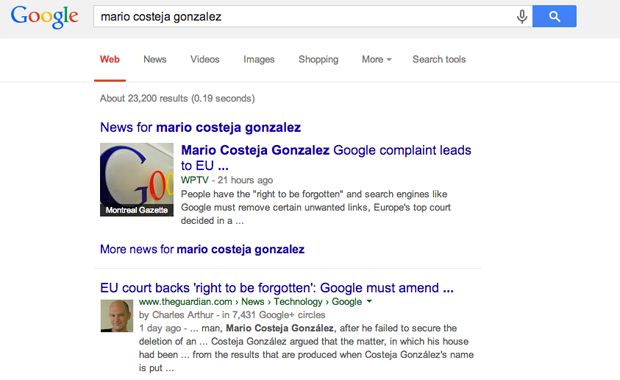When Google tripped: Forgetting the right to be forgotten

On May 13, the Court of Justice of the European Union (CJEU) held in Google Spain v AEPD and Mario Costeja González that there was a “right to be forgotten” in the context of data processing on internet search engines. The case had been brought by a Spanish man, Mario Gonzáles, after his failure to remove an auction notice of his repossessed home from 1998, available on La Vanguardia, a widely-read newspaper website in Catalonia.
The CJEU considered the application of various sections of Article 14 of EU Directive 95/46/EC of the European Parliament and of the Council of October 24, 1995 covering the processing of personal data and the free movement of such data.
A very specific philosophy underlines the directive. For one, it is the belief that data systems are human productions, created by humans for humans. In the preamble to Article 1 of Directive 95/46, “data processing systems are designed to serve man; … they must, whatever the nationality or residence of natural persons, respect their fundamental rights and freedoms notably the right to privacy, and contribute to … the well-being of individuals.”
Google Spain and Google Inc.’s argument was that such search engines “cannot be regarded as processing the data which appear on third parties’ web pages displayed in the list of search results”. The information is processed without “effecting the selection between personal data and other information.” Gonzáles, and several governments, disagreed, arguing that the search engine was the “controller” regarding data processing. The Court accepted the argument.
Attempts to distinguish the entities (Google Inc. and Google Spain) also failed. Google Inc. might well have operated in a third state, but Google Spain operated in a Member State. To exonerate the former would render Directive 95/46 toothless.
The other side of the coin, and one Google is wanting to stress, is that such a ruling is a gift to the forces of oppression. A statement from a Google spokesman noted how, “The court’s ruling requires Google to make difficult judgments about an individual’s right to be forgotten and the public’s right to know.”
Google’s Larry Page seemingly confuses the necessity of privacy with the transparency (or opacity) of power. “It will be used by other governments that aren’t as forward and progressive as Europe to do bad things. Other people are going to pile on, probably… for reasons most Europeans would find negative.” Such a view ignores that individuals, not governments, have the right to be forgotten. His pertinent point lies in how that right might well be interpreted, be it by companies or supervisory authorities. That remains the vast fly in the ointment.
Despite his evident frustrations, Page admitted that Google had misread the EU smoke signals, having been less involved in matters of privacy, and more committed to a near dogmatic stance on total, uninhibited transparency. “That’s one of the things we’ve taken from this, that we’re starting the process of really going an talking to people.”
A sense of proportion is needed here. The impetus on the part of powerful agencies or entities to make data available is greater in the name of transparency than private individuals who prefer to leave few traces to inquisitive searchers. Much of this lies in the entrusting of power – those who hold it should be visible; those who have none are entitled to be invisible. This invariably comes with its implications for the information-hungry generation that Google has tapped into.
The critics, including those charged with advising Google on how best to implement the EU Court ruling, have worries about the routes of accessibility. Information ethics theorist Luciano Floridi, one such specially charged advisor, argues that the decision spells the end of freely available information. The decision “raised the bar so high that the old rules of Internet no longer apply.”
For Floridi, the EU Court ruling might actually allow companies to determine the nature of what is accessible. “People would be screaming if a powerful company suddenly decided what information could be seen by what people, when and where.” Private companies, in other words, had to be the judges of the public interest, an unduly broad vesting of power. The result, for Floridi, will be a proliferation of “reputation management companies” engaged in targeting compromising information.
Specialist on data law, Christopher Kuner, suggests that the Court has shown a lack of concern for the territorial application, and implications, of the judgment. It “fails to take into account the global nature of the internet.” Wikipedia’s founder, Jimmy Wales, also on Google’s advisory board, has fears that Wikipedia articles are set for the censor’s modifying chop. “When will a European court demand that Wikipedia censor an article with truthful information because an individual doesn’t like it?”
The Court was by no means oblivious to these concerns. A “fair balance should be sought in particular between that interest [in having access to information] and the data subject’s fundamental rights under Articles 7 [covering no punishment without law] and 8 [covering privacy] of the Charter.” Whether there could be a justifiable infringement of the data subject’s right to private information would depend on the public interest in accessing that information, and “the role played by the data subject in private life.”
To that end, Google’s service of removal is only available to European citizens. Its completeness remains to be tested. Applicants are entitled to seek removal for such grounds as material that is “inadequate, irrelevant or no longer relevant, or excessive in relation to the purposes for which they were processed.”
An explanation must accompany the application, including digital copies of photo identification, indicating that ever delicate dance between free access and anonymity. For Google, as if it were an unusual illness, one has to justify the assertion of anonymity and invisibility on the world’s most powerful search engine.
Others have showed far more enthusiasm. Google’s implemented program received 12,000 submissions in its first day, with about 1,500 coming from the UK alone. Floridi may well be right – the age of open access is over. The question on who limits that access to information in the context of a search, and what it produces, continues to loom large. The right to know jousts with the entitlement to be invisible.
This article was published on June 2, 2014 at indexoncensorship.org
Both Google and the European Union are funders of Index on Censorship

